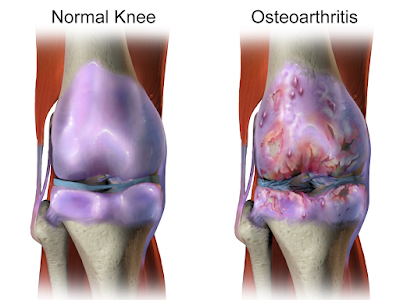593
 |
|||
| Difference between a normal knee and one affected by osteoarthritis.Image credit: Wikimedia Commons |
Damage to the knees, or osteoarthritis, is commonly seen in people who are obese. For many years, it was assumed that osteoarthritis is due to additional stress on the knee joints, due to increased weight. However, studies have shown that the commonly seen side effect of obesity is actually due to the increase in systemic and local inflammation caused by macrophages and other inflammatory cells that are targeting the adipose tissue but the joints tissue are caught in the cross fire and undergo degeneration.
Studies published over the last couple of years have now been able to associate the inflammation seen in obesity to the gut microbiome. While this might sound a bit outlandish, researchers studying the gut microbiomes have found that nature of microbiome of the gut is dependent primarily on the dietary intake. Nature of food intake can distort the natural flora of the gut, which can then effect the inflammatory status in the body, leading to events like osteoarthritis in obesity, but have also been associated with asthma, Type 2 diabetes, Parkison’s disease etc.
In another study published in Endocrine Disorders, researchers found that addition of a prebiotic called oligo fructose, helps in increase of Bifidobacteria, which helps in reduction of inflammation in the body. Researchers at the Zuscik lab at the University of Rochester hypothesized that supplementing oligofructose in diet should therefore reduce inflammation and progression of osteoarthritis.
To test their hypothesis, the team induced obesity in a mouse model by feeding it high fat diet, which predictably led to increased body fat percentage and insulin resistance. After 12 weeks of high fat diet, prebiotic fiber oligofructose was supplemented in the diet, which caused a reduction in glucose tolerance but not body mass. Fecal samples were collected prior and after introduction of oligofructose supplements for obese mice and tested for the microbiomes.
It was observed that gut microbiomes of obese and lean mice were significantly different. Lean mice had abundant levels of Actinobacteria, Bacteriodetes and Bifidobacterium pseudolongum. On the other hand, obese mice had more Firmicutes, decreased Bacteriodetes and almost absent Actinobacteria. Two weeks after the introduction of the prebiotic, obese mice once again, showed higher levels of Actinobacteria, Bacteriodetes and Bifidobacterium pseudolongum.
Cytokine levels were also measured in obese and lean mice prior and after the introduction of oligofructose. Once again, pro inflammatory cytokines that were seen higher in obese mice, fell after the introduction of oligofructose, thus confirming reduction in inflammation after the introduction of oligofructose. Similarly, osteoarthritis was monitored in lean and obese mice, which was also observed to have reduced after the introduction the the perbiotic, oligofructose. The most important factor to note, however, is that introduction of the prebiotic, did not result in reduction of body mass for the obese mice, yet inflammation and associated degeneration of joints were found to be decreased in the study.
Should I buy Oligofructose then?
Well, like with all things in science, this is just a discovery in a mouse model and further validations need to be done in a human study, before any tall claims can be made about a prebiotic. Although, mouse and human gut microbiomes share similarities, it is not necessary that oligofructose, will have the same effect in the human body as it did in the mouse model. One needs to be wait for a detailed human study before proceeding to add/ remove supplements to existing diet.
In the meantime, you could always include conventionally accepted methods of eating a balanced diet and including exercise in your routine to stay healthy.


